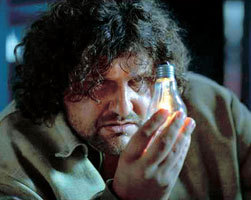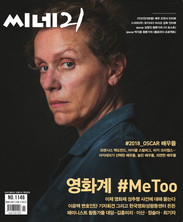러시아가 한국의 발자취를 따라가는 것일까? 지난 7월 개봉된 대규모 예산의 흡혈귀 블록버스터 <나이트 워치>(사진)는 여러모로 러시아의 <쉬리>처럼 보인다. <쉬리>가 <타이타닉>을 이기고 상업영화의 새로운 시대를 초래한 한편 <나이트 워치>는 <왕의 귀환>을 밀어내고 새로운 흥행 기록을 세웠고, 대중 관객이 자국영화를 보는 태도를 완전히 바꿔놓기도 했다.
러시아 영화업계는 업계 붐에 돌입하기 직전의 한국과 다른 방식으로도 많은 공통점이 있다. 같은 길을 걷게 될지는 예측하기 어려우나 러시아의 영화업계는 향후 몇년간 흥미롭게 지켜볼 만할 것이다.
한국영화는 1990년대 초반, 할리우드 배급사의 지사들과의 경쟁에 시장점유율이 16%까지 밀려내려갔을 때 최악의 상태에 이르렀다. 소련 붕괴 시절 러시아 영화업계의 와해는 훨씬 심했다. 1980년대 러시아인들은 세계 웬만한 곳의 영화 관람객 못지않은 열기를 띠었으나, 1995년에 이르러서는 한해 평균 1인당 0.25편의 영화를 봤을 뿐이다. 1995년에 필자는 교환학생으로 모스크바에 살고 있었는데, 도시의 커다랗고 충충한 콘크리트 영화관들이 거의 항상 비어 있었던 게 기억난다. 그 시절 사람들이 가장 관심을 가졌던 것은 연극이었고, 모든 지하철역에서 연극표가 판매됐으며, 매회 공연에 군중이 꽉 들어찼다(지금은 연극계에서 이름을 날린 배우들이 영화쪽으로 관심을 돌렸다. 이중에 <나이트 워치>의 스타인 콘스탄틴 하벤스키도 포함된다).
초반의 영화업계 부활은 정부 지원금에 의해 이루어졌다. 주로 간접적인 재정지원을 제공하는 한국의 영화진흥위원회와는 대조적으로 러시아 영화진흥기구인 고스키노는 자국영화 제작지원을 직접적으로 했으며, 2002년에 400억원, 그리고 2003년에 600억원을 지원했다. 정부는 또한 영화에 투자하는 회사에 세금 혜택을 제공하기도 했다. 그 결과 제작 편수는 매년 100편을 넘기고, 업계에 새로운 세대의 영화인들이 진입하기도 했다. 그들 중 몇명은 영화제 서킷에 파문을 일으키고 있다. 그 예로 (올해 후반기 한국에 개봉예정인) <귀환>으로 2003년 베니스영화제에 황금사자상을 수상한 데뷔 감독 안드레이 즈비야진체프와 같은 이가 있다.
그렇지만 최근에 대기업과 텔레비전이 러시아 영화제작에 좀더 상업적인 요소를 이입하기 시작했다. <부머>나 <안티-킬러>나 <안티-킬러2> 같은 영화는 러시아 스타와 강력한 마케팅 캠페인을 활용하여 적당하게 히트했다. 러시아 텔레비전 방송사가 공동 투자한 <야경꾼>은 평균 예산인 6억원에 대조되는 24억원 예산이 들어갔고, 러시아에서 전적으로 제작된 정교한 특수효과를 선보였다. 광고 연출자인 이 영화의 감독 티무르 베그맘베토브는 PPL을 다량으로 활용하기도 했다. 영화는 삼부작 중 첫 번째로 내년 초에 <데이 워치>를 기대할 수 있다. 할리우드 스튜디오인 이십세기 폭스사는 이미 삼부작 영화의 미국 판권을 모두 사들인 상태다.
이전에 할리우드영화만 개봉하던 러시아 배급사들도 이제 상업적 사고방식을 지닌 젊은 영화인들에게 큰 관심을 보이고 있다. 대규모 예산의 영화제작 역시 계속 이어질 것이다. 이중 140억원 예산의 칭기즈칸 전기를 다룬 영화, 자동차 경주 드라마, 로마 배경의 스파이 스릴러 등 여러 편의 야심찬 작품들이 만들어질 전망이다.
러시아에는 1억4300만명 인구에 늘어나는 중산층이 있다. 현재 러시아의 전반적인 영화시장 규모가 한국의 시장 규모보다는 작지만 무척 빨리 성장하고 있다. 멀티플렉스 극장들이 전국적으로 옛 극장들을 대체하고 있다. 영화제작과 연극의 긴 전통을 지닌 러시아인 만큼 관객이 할리우드영화보다 자국영화를 훨씬 더 선호하게 된다 해도 놀랍지 않다. 그런 경우라면 러시아의 영화업계는 5년 뒤쯤이면 한국의 업계와 무척 비슷해 보일 수도 있을 것이다.
Could Russia be following in Korea's footsteps? Night Watch, a big-budget, vampire-filled blockbuster released last July, looks in many ways to be Russia's Shiri. While Shiri beat out Titanic and ushered in a new age of commercial cinema, Night Watch seta new box-office record by topping Return of the King, and has completely changed the way mainstream audiences look at local cinema. In other ways too, the Russian film industry seems to have much in common with Korea just before it entered its commercial boom. Whether or not it will follow the same path is hard to say, but Russia's film industry is going to be very interesting to watch over the next few years.
Korean cinema reached its commercial low point in the early 1990s, when competition with the Hollywood branch offices pushed local market share down to 16%. The collapse of the Russian film industry during the dissolution of the Soviet Union was much worse. Although in the 1980s Russians were some of the most avid moviegoers in the world, by 1995 the average citizen watched only 0.25 films per year. In 1995 I was living in Moscow as an exchange student, and I remember how the city's big, drab, concrete movie theaters were almost always empty. During those days, it was theatre that people were most interested in, with tickets to plays sold at every subway station, and packed, passionate crowds at every performance. (Now, many of the actors who made theirname in the theatre have now turned to cinema, including Konstantin Khabensky, the star of Night Watch.)
Initially, the revival of the film industry was led by government funding. In contrast to the Korean Film Council, which provides mostly indirect financial support, Russia's film promotion body Goskino provided $34m [400억원] of direct production support for local films in 2002, and $50m [600억원] in 2003. The government also provided tax breaks to companies that invested in film. As a result, annual production now tops 100 films a year, and a new generation of filmmakers has entered the industry. Some of them are making waves on the festival circuit, such as debut director Andrei Zvyagintsev, who won the Golden Lion at Venice in 2003 with The Return (which will be released in Korea later this year).
Recently, however, large businesses and television have been introducing a more commercial element into Russian filmmaking. Movies like Boomer, Anti-Killer and Anti-Killer 2 used local stars and strong marketing campaigns to become modest hits. Night Watch, co-financed by a local television station, cost $4m [24억원] to make compared to the average budget of $500,000 [6억원], and featured elaborate special effects, all done in Russia. Director Timur Bekmambetov, a commercials director, also made heavy use of product placement. The film is the first episode in a trilogy, so we can expect Day Watch early next year. Hollywood studio 20th Century Fox has already bought U.S. rights to all three films.
Local distributors, who used to release only Hollywood movies, are now showing a clear interest in young, commercially-minded filmmakers. More big-budget filmmaking is on the way, too, including a $12m[140억원] biopic of Genghis Khan, a car-racing drama, an espionage thriller set in Rome, and several other highly ambitious projects.
Russia has a population of 143 million people, and an expanding middle class. Although currently the overall size of Russia's film market is smaller than Korea's, it is growing very fast and will probably pass it soon. Multiplexes are replacing old theaters throughout the country. With a long tradition of filmmaking and theatre, it would not be surprising to see Russian audiences developing a clear preference for local movies over Hollywood product. If that's the case, then Russia's film industry could end up looking a lot like Korea's in five years or so.


